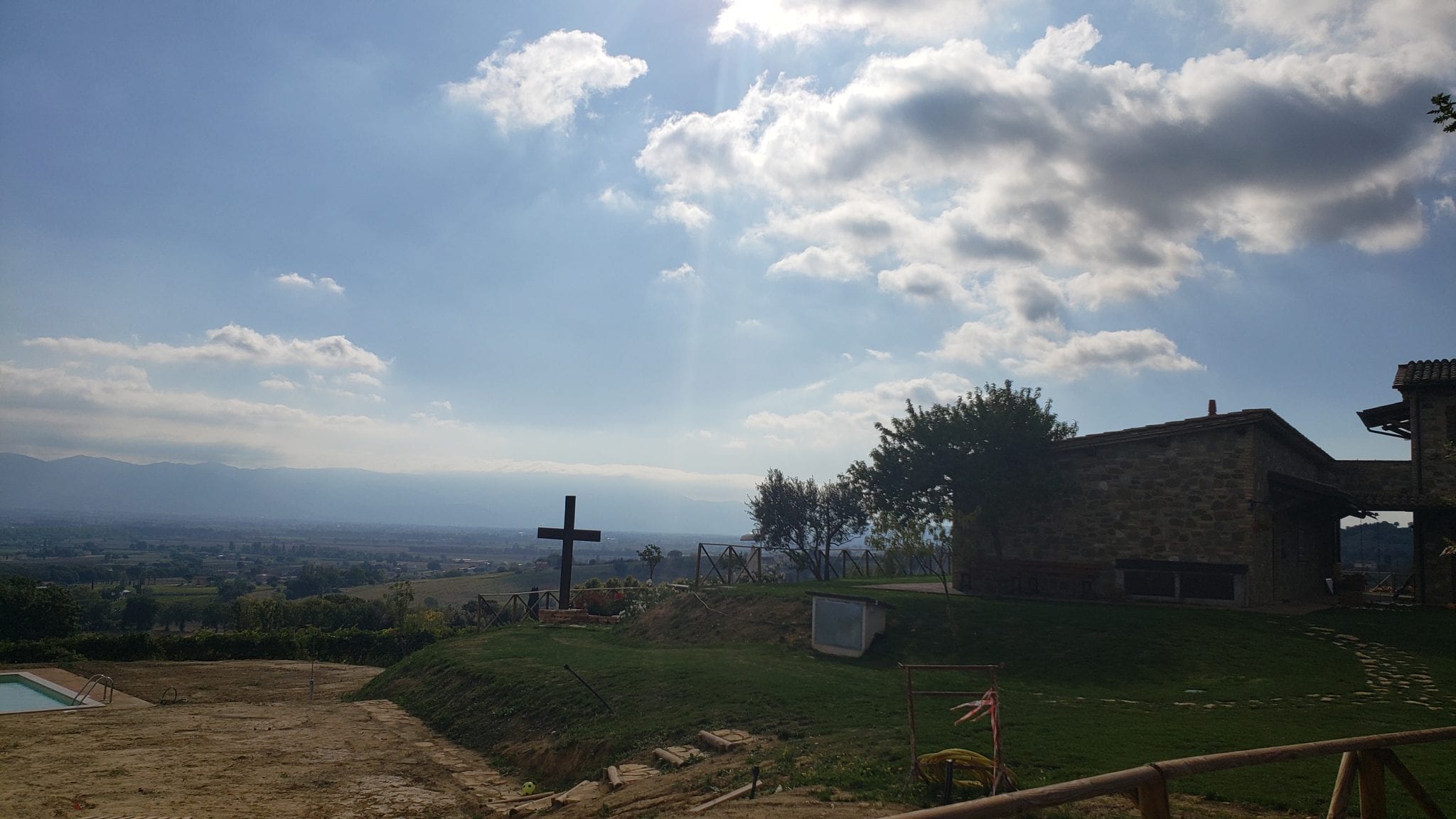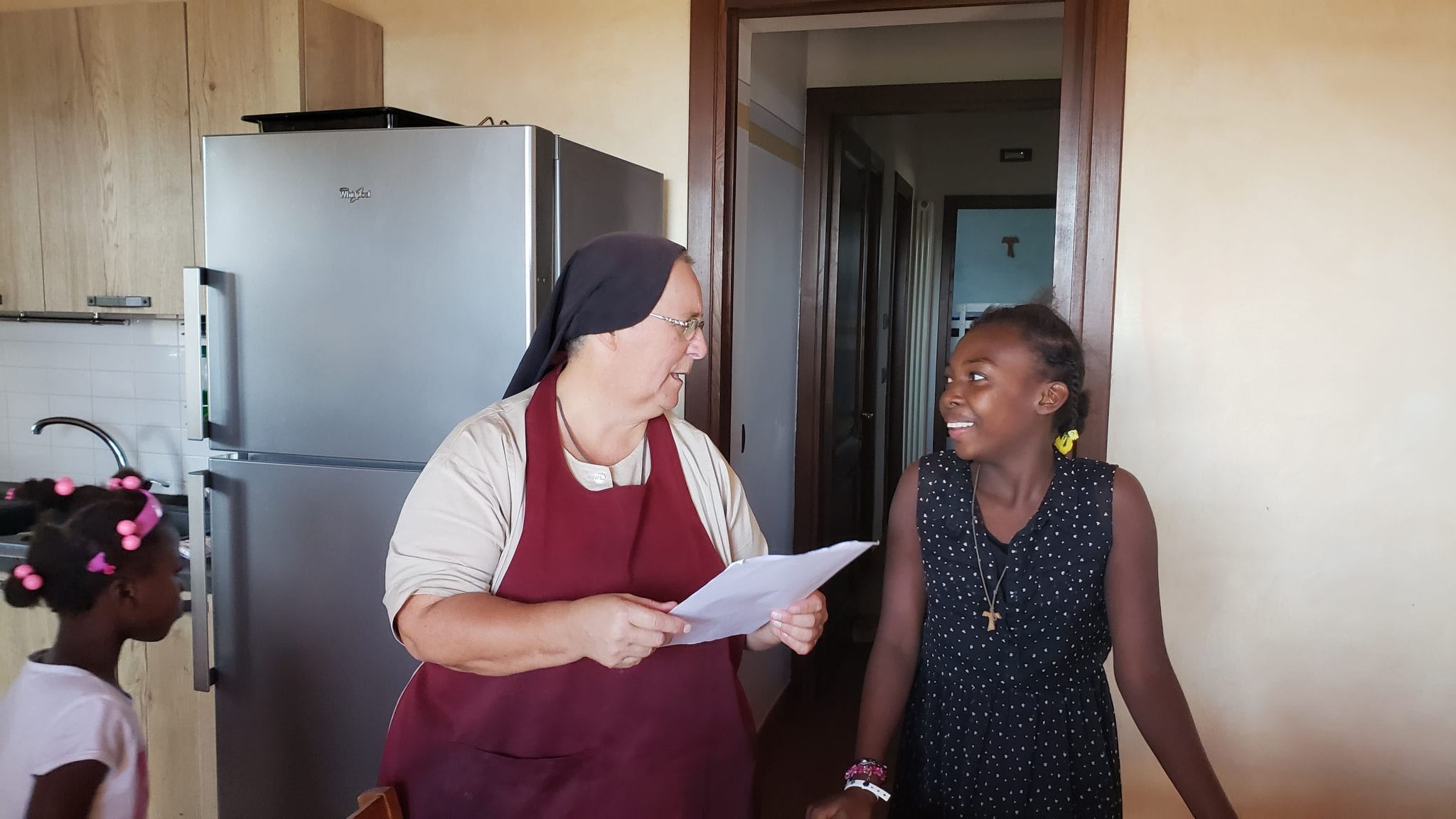ASSISI, Italy – Haiti appears to be unraveling once again, with violence in the streets including a senator getting out of his car to begin shooting at random passersby. Protesters are demanding the resignation of the country’s president, even though there’s no prominent candidate to replace him.
Not to fear: Italian Sister Marcella Catozza, a Franciscan missionary who first began working in Haiti in 2004 after the fall of dictator Jean-Bertrand Aristide, is convinced she’s found the future president of this embattled nation she calls “forgotten by man.”
There’s only one setback: Her future commander-in-chief is currently between 6 and 15 years old and living in Italy under the watchful care of Catozza who, after years trying to help Haiti from within, has changed tactics and is trying to help the country from Cannara, in the province of Perugia, a region “filled with beauty and holiness, for it’s the land of St. Francis and St. Clare of Assisi.”
Her plan is to keep 19 children who came with her for summer camp in Italy for as long as she’s legally allowed. It was supposed to be a three-month experience, but it’s now been five and counting. The children attend a public school, and the home she’s set up also has private tutors to help them learn Italian and other skills.
“I brought them here because the situation in Haiti today has no future,” she told Crux Sept. 30. “We need to do something different to help them build a future. What we’ve done so far is not enough.”
If those helping don’t change tactics, she said, “we continue to perpetuate a system that generates poverty, misery and hunger.”
When authorities eventually force the children to go back to Haiti, Catozza said she’s going back with them.
“They’re receiving an education in humanity,” she said. “When they go back to Haiti, they will want to do something. Hopefully, we will have broken the cycle for these 19 children, going beyond containing an emergency situation.”

Catozza said she wants to give these children the opportunity of seeing that life, even with ups and downs, isn’t a tragedy and that there’s a possibility of building happiness and a beautiful Haiti.
“As a Franciscan, I know that [God] is the ultimate Beauty,” she said. “And I hope the children find it too. But before talking to them about God, I need them to re-discover their own humanity, because they live in conditions that are not human.”
In addition to the house in Italy, Catozza also runs an orphanage in Haiti with 130 kids. As of Monday, she didn’t know what they were going to eat or drink when Wednesday arrived.
Back in the country itself, people in the streets are demanding the resignation of U.S.-backed President Jovenel Moise, who refuses to step down, and violence continues to escalate.
In addition, natural disasters have repeatedly devastated the island nation, one of which almost struck Catozza herself in 2008. Her life, she said, was saved by her mother, who was on her death bed and so Catozza asked permission to return home to care for her. Her mother died on Christmas Eve.
On Jan. 12, Catozza was woken by a phone call: an earthquake again had devastated the country she lived in, and the death toll had been estimated in the thousands. In the end, those estimates fell short: over 350,000 were killed, and, in the capital city of Port au Prince alone, over 24,000 people lost at least one limb.
She flew back to Haiti the following day, on an aid plane from Italy, and the memory of what she encountered is engraved in her memory.
“The country had no excavators, nothing,” Catozza said. “So, to rescue people, they had to be removed in unthinkable ways. The doctors did an amazing job, but the first option was always to amputate because there was no time or structure to think about anything else.”
“I remember the noise of the hammers, which constantly struck buildings in the search of survivors … I remember rows of corpses in the courtyard of the central hospital, people without a name, without an identity, who were later buried in huge graves. They had no dignity, even in death.”
“I remember people on the street looking for their loved ones, hoping against hope that they’re still alive,” she continued. “Even today, I encounter people who tell me they’re waiting for their parents, the children, their siblings.”
“I remember it all … But no one remembers Haiti today.”
On helping Haiti, evangelization and charity
Catozza always wanted to be a missionary, writing her thesis on missionary theology. She spent five years in Brazil’s Amazon rainforest, then went on to Albania, was in Kosovo during the war, and has worked in the Dominican Republic, Vietnam and Mozambique.
“I’ve never found a reality as tough as the one in Haiti,” she said. Beyond natural disasters, there’s bureaucracy, corruption and a general unwillingness to do the necessary things for improvement or let others do them.

“I’m not finger-pointing, I’m just saying that it’s hard to help Haiti,” Catozza said. “Everything is against you.”
With the help of a U.S. priest, she was able to build a school for orphans but the government never gave her the necessary permits to open it. Like other missionaries, she’s allowed to feed the children, provide them with a roof, but not to give them a formal education.
“At the end of the day, we leave them in the same condition of misery we found them in,” the religious lamented. “The thing is, it’s not about helping others so that they don’t starve, but to actually lift them up from misery. If not, the moment you leave, they die of hunger.”
What she’s trying to do, both with the center in Italy and in Haiti, is to restore children’s dignity, “given to them by the fact that they’re children of God,” and also restore their freedom, which she believes they can only receive through education.
“You see the kids on the streets: they don’t go to school, they suffer from malnutrition, they are all alone. The police call me at midnight to tell me they’ve found a child, ask if I can care for him,” she said. “Am I the one responsible for the abandonment? No, I’m the one trying to solve a problem that was there long before I got there.”
Asked about evangelization in these situations, Catozza said that her charism is to “witness to Christ through charity.”
“Charity is the face with which the Lord looks at me in the morning, and decides to give me life,” she said. “He looks at me with charity, and he loves me, in my own freedom.”
“Any intelligent person will look at me and understand that I don’t do this because I’m ‘a good person,’ or because someone donated me the money to help,” Catozza said. “If it was just me, I would have left Haiti two hours after I landed that first time.”
“What I ask for every morning is for the gift of making those who see me feel that they’re loved by Christ,” she said. “Because they are.”
In the case of Haiti, she said, “even though the churches are full,” it’s necessary to start evangelization again. That encounter with Christ is the only thing, she believes, that will help the people live a faith that “makes everything new,” and help overcome the most dire situations.
“Without knowing ourselves to be loved by God, whatever faith you have is that of a holy card, faith in an image, a statue or a building,” she said.
Catozza also believes that the many missionaries currently working in Haiti are evidence that God “hasn’t forgotten Haiti,” but humanity has.
In the Italian valley where she lives, she said, people first confuse Haiti for Tahiti, and when it dawns on them that they don’t hail from French Polynesia, most don’t have any idea “of the misery these kids live in, how exhausting it is just to survive.”
“There’s no talk of the suffering of this people. They have been forgotten by man. Not by God. God never forgets. But humanity does,” she said. “Do you remember Haiti?”
Follow Inés San Martín on Twitter: @inesanma
Crux is dedicated to smart, wired and independent reporting on the Vatican and worldwide Catholic Church. That kind of reporting doesn’t come cheap, and we need your support. You can help Crux by giving a small amount monthly, or with a onetime gift. Please remember, Crux is a for-profit organization, so contributions are not tax-deductible.















